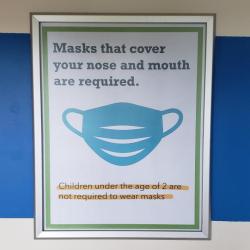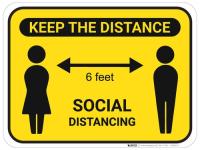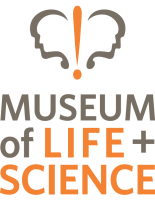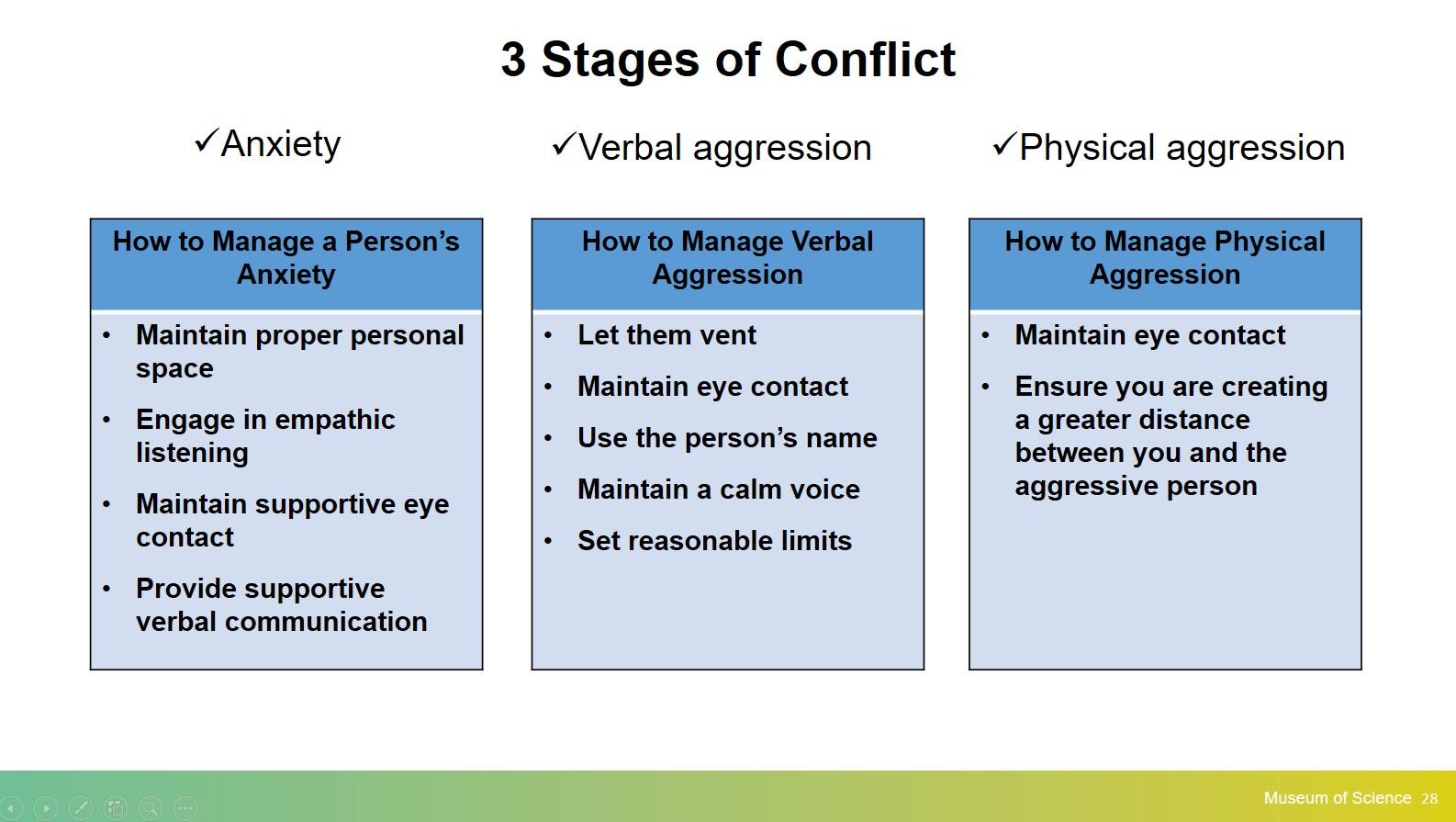
Now that many museums and science centers are beginning to reopen with new Covid-19 safety protocols in place, their front line staff are learning to identify and respond to situations where visitors do not physically distance themselves from others, visitors may refuse to wear a mask, or they are disappointed with changes at the museum such as the closure of some exhibit areas. For all of us, changing our behaviors and expectations is not always an easy process, and museums have been working to respond with empathy while maintaining safety.
To better prepare staff to respond to potentially difficult situations, many institutions have offered staff guest service trainings focused on various visitor scenarios and how staff can identify, respond to, and de-escalate these new and challenging situations.
Below are a few different NISE Network partner examples of museum re-opening experiences, including staff de-escalation trainings and real-life situations they've encountered. Although each institution may take slightly different approaches, they share common strategies in addressing and resolving visitor conflict such as:
- Providing clear communication with visitors regarding mandatory safety protocols that are in place to protect visitors and museum staff,
- Engaging in empathetic listening and remaining calm when addressing visitor concerns, and
- Asking colleagues for help in visitor situations that need positive reinforcement
NISE Network partner re-opening experiences and de-escalation examples
Museum of Life and Science in Durham, North Carolina
Alison Houchin, Director of Guest Operations
Before we reopened the museum we held a Customer Service During COVID and De-escalation Training for our Guest Relations team and recorded the training to share with the whole organization. We feel strongly that these two topics need to be discussed together as proper safety measures have the potential to build walls through wearing a mask and interacting at a six-foot distance. Our goal was to make sure we equipped our team with the necessary tools to communicate clearly and concisely, show positive emotion and convey a warm welcome. These tools are especially helpful when a guest has a complaint or concern but more importantly can help us in avoiding a situation from escalating in the first place.
The most common issue we are running into is noncompliance for our guest mask policy. For a majority of guests, a kind reminder is all it takes for them to put the mask back on. The small percentage of escalated issues still adds up to having many emotionally charged conversations every day. At that point, a reminder of the policy and the science behind it is often what helps to calm the situation down.
Recently, a member of another on-site team encountered a guest not wearing their mask. They reminded the guest of our policy and the guest immediately got defensive and refused to wear their mask. This team member called for Guest Relations and one of our managers met up with the guest and team member. The Guest relations manager greeted the guest and pulled them to the side. After introducing themselves they asked the guest to share their concerns. The guest calmed down and explained their reason for not wearing the mask. The guest mentioned that between the heat and their medical condition the mask was making it difficult for them to breathe. The manager explained our policies and why they are in place. They were then informed that we want them to be safe in the heat – so if they need to take a break from the mask to please be sure to stay more than six feet from other guests. This guest was pleasant to the manager (which often happens once a situation is moved up a level) and thanked them for taking the time to explain the situation and talk with them.
Sciencenter in Ithaca, New York
Cori Thompson, Manager of Guest Relations
At the Sciencenter, the de-escalation steps I've been teaching to our staff are used to help with any difficulties visitors may have with wearing masks, as well as possible disappointment in our current hands-off approach to our exhibits. These steps include:
- Express Empathy
- Give Them the Facts
- Give Them Options
- Allow Time to Think
Our visitors have been very good about wearing masks and we haven't had any major issues with anyone refusing or being upset about the rule. That being said, we still have to remind guests to keep their masks on properly throughout the museum and while playing at our outdoor Science Park.
We have multiple staff members onsite to help with enforcing the mask mandate - if we have to talk to a family more than once, it's best to have a second or third person on staff to remind them of the rules. This is helpful to deflect some of the frustration and anger that could potentially be directed to a single employee. We have mostly used the first two steps of our de-escalation plan: expressing empathy for how difficult it is to wear a mask everywhere, especially in a building or on the playground where you're used to running around without one, and explaining why the rules are in place by mentioning the state mandate and the rules put forth by the Tompkins County Health Department.
I interacted with a family recently who were really struggling to keep the masks on (both the adults and the children in their party), and unfortunately I was the only person who was available at the time to give them friendly mask reminders. On my third time of chatting with them about it, the child was frustrated and asked "Why does she keep saying that to me?" It does start to feel like you (the employee) are singling them (the family or individual) out when you repeatedly talk to them about the same rule. In contrast, we had a similar situation more recently and had three different staff members enforce this rule as the family walked through the museum. There was no issue or comment made by anyone in the group that I am aware of, so I believe having more staff interact and remind them to wear their masks was successful.
Museum of Science in Boston, Massachusetts
Bob Calantoni, Director, Public Safety, Public Safety Administration
A majority of our visitors will respect and adhere to the Museum's new guidelines around social distancing and safety procedures to ensure everyone's safety. While we'll all likely encounter many familiar guest interactions, staff may face some new challenging situations that could escalate, so a Guest Service for COVID Times Training was provided to all institutional staff to review some techniques on how to identify the stages of conflicts and provide staff with tools to manage and de-escalate these types of situations.
It's first important to recognize the 3 Stages of Conflict and what they consist of:
- Anxiety - can stem from when an expectation is not met, may be related to past experiences
- Verbal aggression - can be a threat to self-esteem or sense of dignity, frustration, prolonged eye contact, raised voice
- Physical aggression - may include lips tightening over teeth, head is down, verbalization completely stops, breaks eye contact
If we identify that a person we’re speaking with is exhibiting any of the above signs, we can use tools and techniques to help de-escalate the situation.
There are a number of tools at your disposal when confronting a challenging situation, such as using:
- Empathetic Listening
- Engage in attentive listening - "Listen with your ears, eyes, and heart. Listen for feelings and meaning."
- Listen with intent to understand, rather than intent to reply
- Verbal Communication Techniques
- Calm, reassuring voice
- Speak with respect
- Ask open ended questions
- Avoid using "You"
- Paralanguage - non-verbal communication such as tone, pitch, manner of speaking
- Non-Verbal Communication
- 90% of all communication is non-verbal
- Avoid crossing your arms, pointing fingers, leaning in or getting too close
- Maintain personal space
- Relaxed body posture and open stance
- Provide eye contact
- Show concern and confidence
- Asking for Help
- Politely ask the guest to wait for a moment and scan for nearby colleagues
- If you have a radio, call a colleague you believe may be able to assist you or as Public Safety for Assistance
By utilizing these tools we can help deescalate a situation, whether we’re dealing with it on our own, or if we’re asked by a colleague for assistance. The goal is to not allow the situation to escalate to physical aggression.
De-escalation resources
- Hot Topic: Considerations for Mask Policies, AAM
https://www.aam-us.org/wp-content/uploads/2020/05/Face-Masks-5.28.20.pdf - The Crisis Institute Prevention (CPI), a leader in evidence-based de-escalation and crisis prevention training, has shared tips and tools to address the urgent public need to anticipate and verbally calm situations related to COVID-19 before they escalate – such as de-escalation tips in light of coronavirus anxiety and de-escalation trainings for the workplace.
- How to Diffuse a Difficult Situation - in Just Five Words
www.youtube.com/watch?v=ShXJM70bwU0 - Defuse and Aggressive Confrontation
https://www.youtube.com/watch?v=c2RDbL3QBhs&feature=youtu.be - How to Deal with A Very Upset Customer – Extreme Customer Support Guidance
www.youtube.com/watch?v=v07FSyrFm1E - De-escalation trainings from the Training Institute
https://www.traininginstitute.org/w/ - Nine De-escalation Skills
https://www.youtube.com/watch?v=MOeuoNP-fyQ




